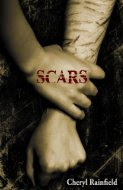[Book cover credit: librarything.com/work/1567168]
Awards:
ALA Best Fiction for Young Adults (2011)
Batchelder Honor (2011)
Printz Honor (2011)
Booktalk:
Pierre Anthon has decided that nothing matters. He's also decided to sit in a plum tree and harrass his former classmates until they come to the same conclusion. They have to make him stop. They have to show him that there is something that still holds meaning. In order to do so, they each must sacrifice something that holds a great deal of meaning to them.
Review:
Disturbing does not even begin to cover it.
Nothing is a tiny book. It's shorter than most and more narrow. The story takes up slightly more than 200 pages, and those pages contain a lot of white space. Still, it is probably the most disturbing book I've ever read. And almost not even in a good way. Don't get me wrong, Nothing is a wonderfully written book. Not a single word is superfluous and yet the story feels expansive. We see the whole thing from Agnes' point of view, and yet the feelings of others and the crowd mentality of the group are clear. It's got a kind of terrible, terrifying beauty to it. As one LibraryThing reviewer said, "There is no age appropriate for this book."
As Agnes and her classmates try to collect things to counter Pierre Anthon's nothingness, things take a definite turn towards the sinister. If they're going to prove meaning, these things must really mean something to the person who has to give them up. And each time someone has to give something up, they get to choose what the next person has to lose:
When Dennis had first handed over the last four of his Dungeons & Dragons books, it was as if the meaning started to take off. Dennis knew how found Sebastian was of his fishing rod. And Sebastian knew that Richard had a thing about his black soccer ball. And Richard noticed how Laura always wore the same African parrot earrings.This accumulation of things starts out as mean and a bit vindictive, but it very quickly spirals out of control until it is not just things that are being accumulated. Friendships break up, kids get in trouble, alliances are formed, and people get both emotionally and physically hurt.
p.35
Watching what these kids require of their friends and classmates, what they deam worthy sacrifices to the "heap of meaning," was like driving past a multiple car pile-up on the freeway. It's gruesome and terrible, but you can't help but look. I finished this book in a single day, holding my hand over my gaping mouth for the last 50 pages or so (and more than a few times before that as well). I was repulsed and hooked at the same time. This is an engrossing and haunting read.
Book source: Philly Free Library
Links to Amazon.com may be affiliate links for the Amazon Associates program. If you buy something through this link, I may receive a referral fee.










